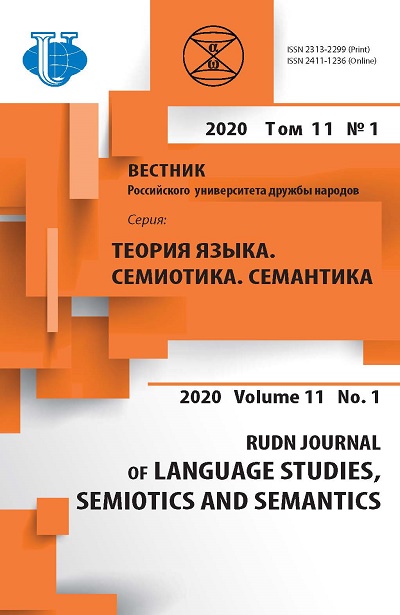Alice from the Tales of L. Carroll as a Character and Linguistic Personality
- Authors: Ryadchikova E.N.1, Kadilina O.A.2, Balian A.M.3
-
Affiliations:
- Kuban State University
- Kutafin Moscow State Law University
- Kuban State Medical University of the Russian Ministry of Health
- Issue: Vol 11, No 1 (2020)
- Pages: 64-77
- Section: COGNITIVE RESEARCH
- URL: https://journals.rudn.ru/semiotics-semantics/article/view/23043
- DOI: https://doi.org/10.22363/2313-2299-2020-11-1-64-77
- ID: 23043
Cite item
Full Text
Abstract
The relevance of this work is determined by the importance of studying the problem of the child’s linguistic personality as a fiction character in a linguistic-pragmatic manner, from the writer’s linguistic personality intentions and characteristics perspective, and insufficient linguistic aspect knowledge of Lewis Carroll’s works about Alice’s adventures. The work substantiates the following: as opposed to the fact that, due to ontological characteristics, individual mental, psychological and physical development and personality growth, the degree of their language acquisition and communicative skills, primary school age children are usually weak or average linguistic personalities, while fiction characters of this age are able to meet the parameters of a strong linguistic personality. It has been established that the preferred, highly appreciated by L. Carroll qualities of a seven-year-old English girl are as follows: high level of cognitive-speech development, speech-cognitive processes, vocabulary, ability to communicate, reflect, draw conclusions, evaluate and express one's opinion in words, intelligence superior to the development of an average child of this age, as well as Alice’s internal qualities, manifested in her speech activity, taking into account not only speech peculiarities, but also themes and stylistics, communicational strategies and tactics, pragmatics, perception adequacy and the interlocutor’s speech understanding, influencing the opponent with the paralinguistic methods, psycho-emotional background of communication. These qualities make it possible to characterize a given linguistic personality of a literary character as strong. A number of Alice's qualities allow her to be considered as a national-cultural English type of personality.
About the authors
Elena Nikolaevna Ryadchikova
Kuban State University
Author for correspondence.
Email: e.n.ryadchikova@gmail.com
Doctor of Philology, Professor, Professor of the General and Slavic-Russian Linguistics Department, Faculty of Russian Philology
Stavropolskaya Street, 149, Krasnodar, Russian Federation, 350040Olga Aleksandrovna Kadilina
Kutafin Moscow State Law University
Email: olgakadilina@gmail.com
Candidate of Philological Sciences, Senior Lecturer
Sadovaya-Kudrunskaya Street, 9, Moscow, Russian Federation, 125993Ashhen Muradovna Balian
Kuban State Medical University of the Russian Ministry of Health
Email: ash.balian@yandex.ru
Senior Lecturer
Sedina Street, 4, Krasnodar, Russian Federation, 350063References
- Tarasenko, E.V. (2005). A fragment of speech portrait: primary school student (syntactic level) In Actual problems of theoretical and applied linguistics: Interuniversity scientific journal. Krasnodar. Part 2. pp. 172-181. (In Russ.).
- Desyaeva, N.D. The linguistic personality of the child and the ways of its formation in elementary school. URL: http://yspu.org/images/5/53/DesyaevaND.pdf. (accessed: 08.08.2017). (In Russ.).
- Sedov, K.F. (1999). The formation of oral discourse structure as an expression of a linguistic personality evolution [dissertation]. Saratov: Pedagogical Institute of Saratov State University n.a. N.I. Chernyshevsky. (In Russ.).
- Kuzmina, I.S. (2009). Cognition and pseudocognition as a text phenomenon (based on the material of a children's literary fairy tale in English) In Linguistic and extralinguistic problems of communication: theoretical and applied aspects: interuniversity collection of research papers with international participation. Vol. 7. Saransk: Publishing House of Mordov University. pp. 250-255. (In Russ.).
- Bilan, T. (2015). Alice’s Adventures in Scienceland. Libri & Liberi, 4 (2), 313-340.
- Karaulov, Y.N. (2010). Russian language and linguistic personality. Moscow: Publishing house LCI. (In Russ.).
- Derbisheva, Z.K (2014). Linguistic personality of Ch. Aitmatov: mental formulas. RUDN Journal of Language Studies, Semiotics and Semantics, 5(3), 35-45. (In Russ.).
- Tripolskaya, T.A. & Goncharova, E.A. (2014). Dynamic processes in the lexicon of a language personality. Novosibirsk State Pedagogical University Bulletin, 4(3), 57-67. DOI: http://dx.doi.org/10.15293/2226-3365.1403.06. (In Russ.).
- Kadilina, O.A. & Ryadchikova, E.N. (2018). Strong, weak and average linguistic personality in communicative-pragmatic and linguoculturological aspects. RUDN Journal of Language Studies, Semiotics and Semantics, 9 (4), 859-882. doi: 10.22363/2313-2299-2018-9-4-859-882.
- Ryadchikova, E.N. & Kadilina, O.A. (2009). Organization of a linguistic personality as a linguistic-cultural phenomenon In Studies in theoretical and applied linguistics. Krasnodar: KubSU. pp. 50-83.
- Vinogradov, V.V. (1930). About fiction. Moscow-Leningrad: State Publishing House. (In Russ.).
- Smirnova, A.A. (2011). The linguistic personality of the character of a literary work and the psychotype of a person (for example, the works of M.A. Bulgakov) [dissertation]. Moscow: MGOU. (In Russ.).
- Churilina, L.N. (2002). Lexical structure of literary text: principles of anthropocentric research. SPb. (In Russ.).
- Ryadchikova, E.N. & Tarasenko, S.V. (2007). Linguistic and cultural principles and ways of reflection of national consciousness and national culture in language. The Bulletin of the Adyghe State University, the series "Philology and the Arts", 3 (26), 13-20. (In Russ.).
- Zakhoder, B. (1990). No chapter from which one can nevertheless learn something In L. Carroll. Alice's Adventures in Wonderland. Krasnodar: Publishing house. pp. 6-12. (In Russ.).
- Ryadchikova, E.N. & Tkhakushinova, Zh.B. (2009). Speech etiquette as an indicator of a strong linguistic personality of a politician. The Bulletin of the Adyghe State University, the series "Philology and the Arts", 4, 150-154. (In Russ.).
- Demurova, N.M. (1985). Notes In Carroll L. The Adventures of Alice in Wonderland. Moscow: Pravda. pp. 296-317. (In Russ.).
- Balyan, A.M., Kushu, S.A. & Zadorozhnaya, E.Y. (2007). Linguocultural features of the English-speaking linguistic personality, ASU Bulletin, 4 (207), 49-56. (In Russ.).
- Ryadchikova, E.N. & Kadilina, O.A. (2011). Distinguishing cultural features of the strong linguistic type of the English speaking personality, Polylinguality & Transcultural Practices, 2, 103-107. (In Russ.).
- Balian, A.M. & Lux, I.G. (2018). The National Specificity of Alice L. Carroll as a Linguistic Personality In Materials of the III International Scientific and Practical Conference «Actual Issues of Modern Philology: Theory, Practice, Development Prospects» (Krasnodar, April 21, 2018). Krasnodar: KubSU, 2018. С. 61-65.
Supplementary files












